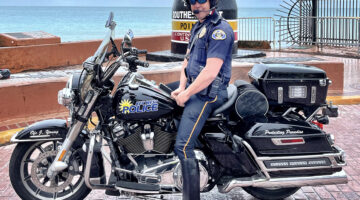HIGH NOTES
Keys Chorale a pleasure in open air
KONK LIFE STAFF WRITER
The FKCC Keys Chorale, led these days by Jim Cutty, gave its first concert of the season last Friday night. Forsaking the usual venues, the Chorale sang outdoors behind the college, to a large and enthusiastic audience seated on an array of beach chairs. The setting was ideal. The weather cooperated, with just the faintest touch of evening coolness. The visual scene was dramatic, with the singers, in formal dress, lit up on stage with darkness behind them. And there was pleasure, as there always is, in good music made out in the open air.
The Chorale’s ensemble singing was excellent. Jim Cutty has done a fine job of getting them to sing together, and there were no voices dripping over the edges of the phrases. Wherever it was appropriate, as especially in two selections from “The Messiah,” the Chorale came on with full power, musically and emotionally. That has always been its great strength, and there’s reassurance in the fact that it’s still there.
The program allowed for quite a lot of singing by individuals and small groups. There was a women’s septet, “The Major 7,” and a men’s quintet, “The Southernmost 5,” each of which acquitted themselves well on two selections. As for soloists, there were 15, an unusually high number for a Chorale concert, but there were no weaknesses. Among the men, Richard McKee and Rick Boettger stood out; among the women, Ginny Barr and Monica Haskell. Kimberley Debus was especially fine on the old Sinatra tune, “Have Yourself a Merry Little Christmas.” Her voice is lovely, and in her phrasing, she showed an eloquent respect, worthy of the master, for the lyric.
As often seems to happen, the outstanding solo—placed appropriately almost at the concert’s conclusion, to end on its best note—was by Maj Johnson, this time on Frank Loesser’s “What Are You Doing New Year’s Eve?” She sang it in an easy, controlled swing. She gave it real drama, with dynamics which lost none of their expressiveness by being consistently underplayed. And she got right to the emotional center of the tune. It occurred to me that if she’d sung it that way in a recording studio, where the slightest flaws are glaring, one wouldn’t want to change a note. Look for her March 1 concert, for lots more of the same.
The Chorale consisted of 60 singers, with a good balance among the sections: 19 each of the sopranos and altos, 11 each of the tenors and basses. Will Johnson, on piano, demonstrated a nice touch in his accompaniment. Donna Dallas’s flute had its usual fine sound, and her background lines were played buoyantly. Since there was no drummer, Joe Dallas, on bass, had double duty in providing the rhythmic drive; he brought that off strongly, and one could hear its effect on the singing.
The program was well designed, with, to me at least, three exceptions. “Variations on ‘Jingle Bells’” was a pastiche of different ways to write the melodic line of that most familiar of carols. To me, it had the odor of the conservatory, perhaps a sophomore level project in composition class. “Jingle Bells” is a clear, simple melody, and arrangers would do well to leave it alone. Melody Cooper’s talents as soloist were better employed elsewhere.
Another selection which could have been omitted was a musical rendering of Clement Moore’s poem, “Twas the Night Before Christmas.” Three good soloists, Brad Richards, Christine Gorham and Ralph Garcia, sang well, but the music itself was little more than an interference. Again, this is a classic, which is best left in its original form.
And the next-to-last number was “Rudolph,” the ultimate in dreadful Christmas cutesiness, with the lyrics thoughtfully provided on the back of the program so that the audience could join in. Thanks, but no.
The Chorale has been through some hard times lately. As this concert proves, they’ve come out of that very nicely, which is much to be applauded.
[livemarket market_name="KONK Life LiveMarket" limit=3 category=“” show_signup=0 show_more=0]



No Comment